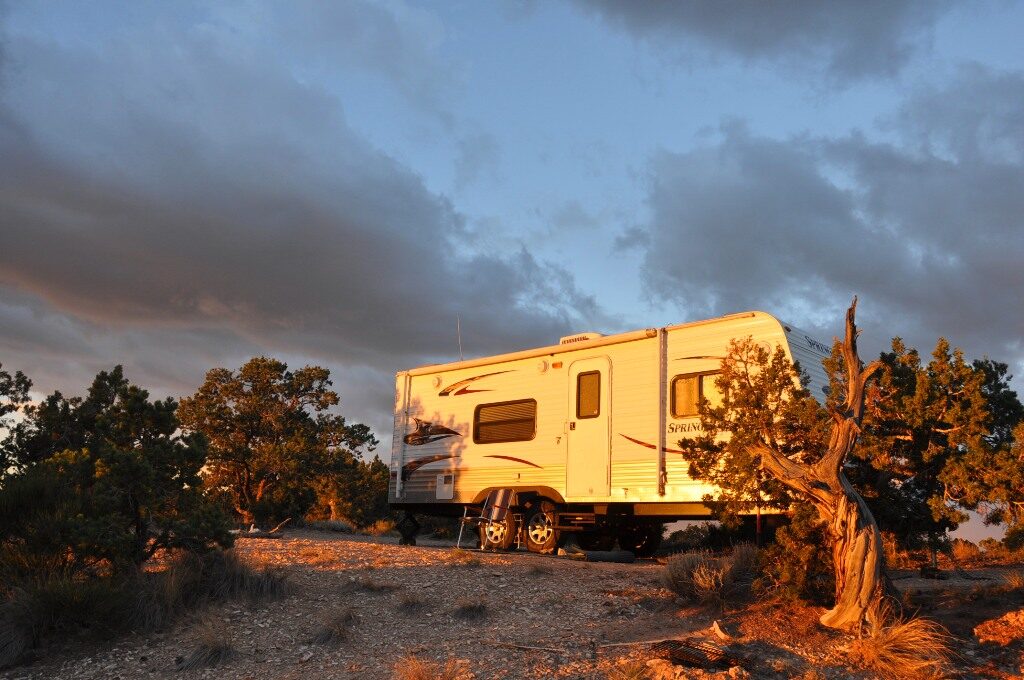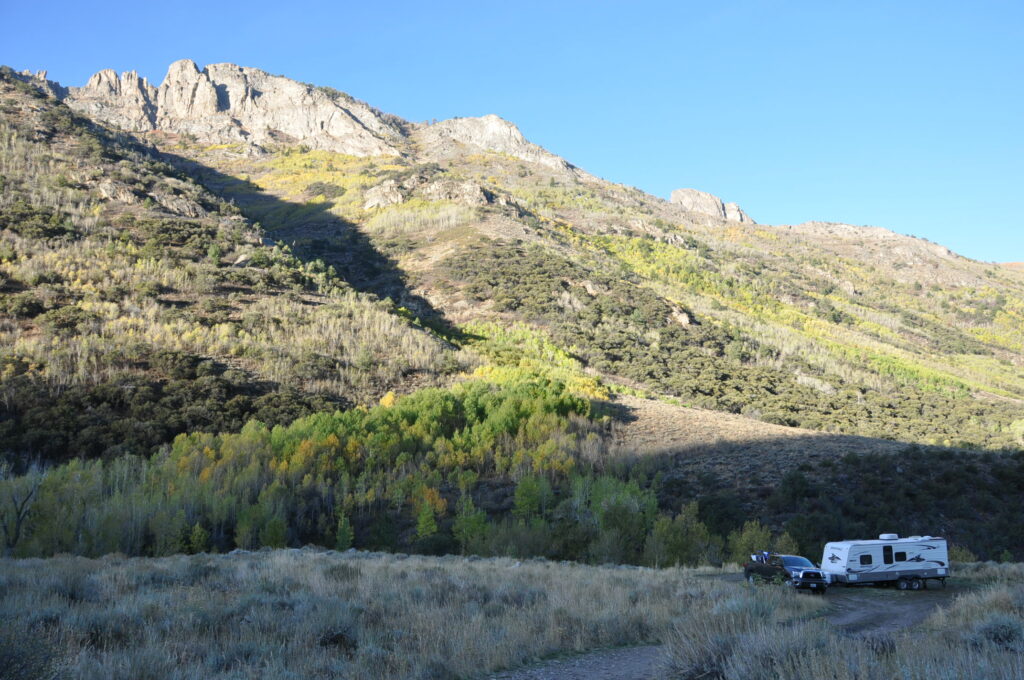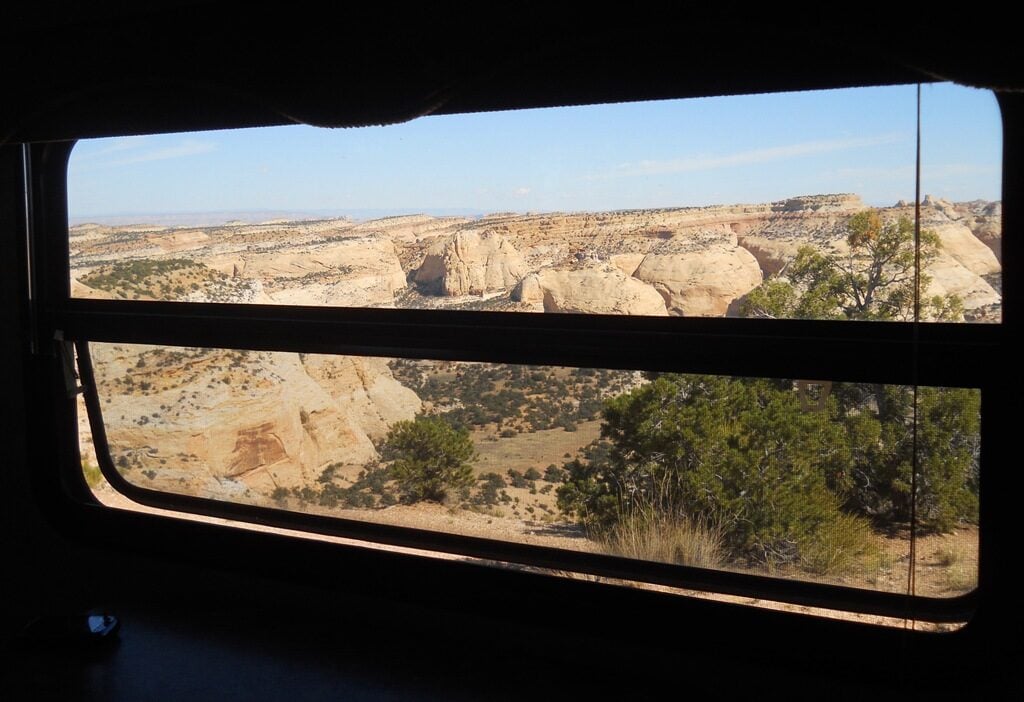If you have worn out a set of tires driving all over to attend RV shows, collected so many sales brochures that you had to hire a librarian to catalog them, and visited so many RV manufacturers websites that you can’t remember the difference between a Foretravel and a Forester, then you have analysis paralysis and I have a tip for you.
There is no such thing as the perfect RV—it will always be a compromise.

Shorter RV lets us enjoy tight campsites – Photos via author
If you get one large enough to have all the features you want and storage to take everything with you, it will be too big for some campgrounds and the fuel mileage won’t be ideal. It may not fit your budget either.
Conversely, if you get a smaller RV that’s easier to drive and park in rural campgrounds, you probably won’t be able to have the desired master bedroom suite, three 55” TVs, 100-gallon freshwater tank, and two bathrooms.

Good ground clearance to access and level up in camp spots like this
So how do you decide which RV is right for you? Prioritize your needs into categories such as; “must haves”, “important”, “would be nice, but can survive without it”, etc.
Here is how my wife and I chose our current travel trailer:
Must-haves:
- Island queen bed so neither of us had to crawl over the other one
- Half-ton towable
- 27-foot or shorter, so we can park it at home and fit in smaller campsites
- A couch so we didn’t have to sit at the dinette all the time
Important:
- Large freshwater tank for extended boondocking
- High clearance for going off-road
- A shower I can stand up in
- More than one exterior baggage compartment
- A freestanding lounge chair
Would be nice, but can survive without it:
- Canned food “pantry” so we don’t have to store canned goods in overhead cabinets
- 8-foot refrigerator
- Big windows to enjoy views and skylight(s) to let light in
- More than one roof vent
We ended up with a trailer that had all of our “Must-Haves”, the majority of the “Important” items, and even a few of the “Would be nice, but can survive without it” features.

Big windows to enjoy views
We spent less than a couple hours making our decision and we actually never even looked at the unit together. It really can be that easy to decide on which RV to purchase if you prioritize the features you are looking for.
Just say “enough” to analysis paralysis and buy a unit using the guidelines above to start enjoying your own adventures in RVing!

Dave,
I’ll take an opposing view and here’s why: Most rv’ers start out with a smaller rig and over the course of 3 to 5 years they generally trade up to a larger rig. Why not buy your last rv first? It would save a lot in depreciation having to take a huge loss every time there’s another buying decision made. You’ll never say “But I wanted less room, less storage, a smaller galley”, etc, etc. We would have followed this scenario too in the beginning but we too made the mistake of buying smaller first. By the way- you won’t have to trim your wants and must-haves down so much either, right?
Drew
We have steadily moved to smaller RV’s over the years- reason being many of the more scenic desirable campgrounds that appeal to us simply can’t accomodate larger RV’s.
If they have large spots at all they are much fewer and harder to get.
We often sit in our spot amused at the large travel trailers/fifth wheels/motorhomes circling the campground repeatedly, apparently in disbelief they can’t fit into any of the available sites.
Bigger is not better. The optimal RV size for maximum deployment is no larger than what will fit in one standard parking slot. As size grows beyond that, the restrictions grow logarithmically.
If restrictions only grew logarithmicly there would be very little of a problem. Perhaps you meant exponentially?
Absolutely right. My mistake. I’m lucky my faux pas fell on receptive ears.
Tnx,
When you say small, how small are you talking about?
Prior to initiating a search, develop your Requirements Statement.
For example:
*** We choose reliable over snazzy and speedy.
*** We choose durable over dozens of vulnerable parts.
*** We choose longevity over trendy.
Develop your Requirements Statement, and let us know your progress.
The BEST RV is the one that is all paid for!
We have a 21’ Lance camper trailer without slide outs. We love it. It has an island queen bed, a must. Slide outs add hundreds of pounds. We pull with a Tacoma and didn’t want the extra weight. Remember, you are camping, not setting up home with lots of unnecessary things. Be a minimalist.
There are two crucial decisions that take precedence because they dictate what can be done:
2-3-4 season will determine if you must flee certain areas at certain times, pickle your trailer and lose its use several months per year or be oblivious to temperature changes.
Boondockability determines if you can dry camp off-grid or be limited to paved highways and overpriced RV slums.
These two decisions will determine what you will be able to do and what it will cost.
We bought several OLD class C’s to start with. I found one we both Loved and put a lot of work in it and then after using it several times in the fall and winter, spring arrived. All of a sudden I had all kinds of trouble and after being stranded several times and rebuilding almost every thing from the gas tanks forward it turned out to be the fault of Gasohol I had already replaced all the gas pumps, (three) and had one left over so I added that one back on to increase the fuel pressure and all the issues disappeared. It was vapor lock which was solved with more pressure. Then I couldn’t get wife to trust it even though I kept insisting “I fixed it” New tires new breaks new antenna new TV, New carpet, New engine computer, new electronic ignition module, and lots of labor I managed to sell it for exactly what I had in materials and oroiginal cost. Whew!! So we bought a Brand new Jayco travel traler and proceeded to tow that across country and down the Baja for sixty days on the road. Travel Trailers apparently are not made to do that much traveling! Wooden frame and all. ,, Who knew. Still under wuarantee with screws loosening all over , we traded that back to the same dealer for a USED Fifth wheel aluminum frame 32 footer. oh heck.,,,,,, now the pick upI bought fo9r thee tt is not quite large enough, so after six months using that , I traded the truck in for a huge loss to get a bigger engine truck with four wheel drive also. I’m pretty happy with what we now have, but I could have had a small class ‘A’ for what I spent and then I could have used the VW Passat that I traded for the first truck ,, as a towed vehicle. So the Fiver is paid for but I have a mortgage on the truck. We have now been across country four times and are planning the next trip across a northern route this summer. It’s only money and you can’t take it with you.
Oh My!!!
All so true. Thanks for the chuckle.
I suggest before buying rent something close in size to what you’re considering for a week long trip with several moves between parks. That will give you a start at realistic expectations for: your needs re: living/cooking/sleeping spaces, truck capacity, state parks vs commercial, reasonable daily travel miles, etc.
That’s a good way to avoid buying a second RV.
As a single woman with a reliable 2006 1/2 ton v-8 Chevy truck, that’s towed 24 foot trailer before when I had a partner, what’s your take on going solo RVing? Trade truck in for motorhome and pull CRV or buy small travel trailer again and use what I have to pull pull new trailer? Reason tells me buy new travel trailer keep truck. One it’s less money out of pocket but a little more work to set up than relatively new motorhome and trail car.
We dd the normal process of starting smaller and growing over time. One of the advantages of starting smaller is to determine if the RV lifestyle is really for you prior to making a larger investment. It also gives you some hands on experience prior to towing or driving a bigger rig.
Have experience with all different types of RV’s during my life. All have benefits and downsides. When someone asks me “which is best” I question them on what type of travel/camping they expect to do and get a handle on their life stage and family size. Some thoughts:
– pop up trailers are great for families if you have a single destination a days drive away or 1 destination/week traveled. Best for Summer camping and if staying at established campgrounds with bathhouses. Economical to own. Need to protect tent material from rodents in storage.
– hybrid/pop out trailers are great lightweight option for families that are touring as you can pull off the road and use for meals, breaks, etc. Quick to setup/take down. Not the best for colder camping as heat excapes the tent ends. Also hard to cool during heat spells. Need a moderate sized tow vehicle. As with pop ups not great in noisy campgrounds.
– hardsided travel trailers. Great for families or couples with many layouts to choose from. We prefer rear living, 1 slideout and a front bedroom – perfect for a couple with occasional guests. Can use for meals/breaks during travel days. Great for trips where you stay at least 2-3 days at each site, longer better. Good for 3 season camping. Quiet inside if in a noisy area. Need moderate to HD tow vehicle depending upon size/weight. Suitable for boondocking if equipped properly.
– 5th wheel is great if you have a HD pickup as a tow vehicle. Full of amenities/benefits similar to hardsided trailers. Nicer to tow and can tow a 2nd trailer in some states.
– class C motorhome – great for touring situations and can tow a smaller vehicle, boat, etc, if you want. Not best for longer stays in one location if you have day trips (unless you tow another vehicle). It’s another vehicle to register and insure and engine to maintain. Great option if you don’t want to own/maintain a HD tow vehicle.
– class B – good for couples or singles touring, tailgating, or for shorter trips. Many different shapes/sizes.
– class A – similar to previous 2 – for people of means that have $$ to burn or are full timers.
I’ve looked til I’m crosseyed. Wish list is true w/around bed with nightstands (no “wheel well” thingies in the way – I think its the outside storage intrusion), room at end of bed to walk not scootch like a crab, or door entries on both sides of the bed, 25′ MAX including hitch,shorter if possible, no toilet in view when bathroom door is open (huge pet peeve), bathroom with wardrobe, bathroom with sink inside the room, tall tub w/shower so can install curved shower curtain for more elbow room, 2 recliner chairs, or 1 recliner loveseat/sofa, smaller sinks/more counterspace, 3 or 4 burner stove big windows that slide sideways to open not just the bottom half opening, outside storage large enough to store folding camp chairs (not the bag kind), lightweight 7500# loaded max.
Any suggestions? We have a beautiful old 92 Travelaire 19′ in great shape that we’ve had for years and have had the best times ever but getting older now and need the w/a bed and a recliner! If I could figure out a way to put a w/around in there I would! I’d ditch the dinette in a heartbeat for a recliner love seat (which could be done easily enough I think – it’s the bed that’s the biggest issue). Perfect length/weight for hauling, storing, flipped axles. It’s a dream…
We have a class B and are considering a move to a trailer very similar to what you found. Would you mind sharing what you ended up with? Our criteria seems very similar.
Yes, but with all the information you gather, is there an app or website that you can put the information in to find that perfect rv? I am on my 4th trailer and none of them have been “the one” for both my husband and I.
We have RVing friends – one with a DP Class A, one with a Gas Class A, and one with a large 5th wheel. In the fall of 2017, we were invited to accompany them on part of a trip they were planning from North Texas (DFW area) to Pensacola, FL. The friends continued on further south while we stayed an extra day in Pensacola before returning home. For this, our first RV trip, we rented a 37 ft Class A and, for several months, I prepared myself for driving it and “servicing” the coach’s systems by watching numerous videos online. 15 months later we bought a 5 year old 37 foot gas Class A with a bath and a half and a king size bed for $88,000 with only 16,000 miles on it in Texas. Researching online, I had found 11 other (identical) rigs at various prices with the highest being $194,000. We are perfectly satisfied with the coach except for the low fuel economy (7 mpg) and less power than a Diesel Pusher. However, we don’t think we would be happy in anything smaller. We plan to full time when we sell our house. I am 80 and my wife is 73.
All good view points but I took a different tack. As a previous live aboard sailor on a 32’ Downeaster I feel smaller is better but not cheaper!
After a year of looking, researching and saving we bought the most expensive small pull behind I could find. Proud owners of an Oliver Legacy Elite ll, it does what I wanted it to do! My first TT but it is Comfortable, Solid and Four Season. She pulls great, good on mileage appears to hold her resale value very good. Alaska, here we come!
I am in my 80 s. Lost husband year ago. Always wanted RV. Have 31 ft Jayco. It has been a mess. Everything has broken on it. Plumbing. 3x repair generator. GFI bad due to leaks this is 2019 model. Lots of electrical issues. Trim coming loose in the kitchen. Pull out bed does not work. I could go on. Oh. Awning. Broke two times. Warranty will not cover it. Back up warranty would not cover it. The awning is too long or the braces are too weak. Any way. I am looking for something smaller that is more maneuverable. Class b. Which are good quality. Gas vs diesel. And not a fortune. Even a used one. But I want to live in it fir a year or two. So need done storage. I have not been able to get out and see the live models but like a lot of windows. And the rear couch seating arrangements seem nice